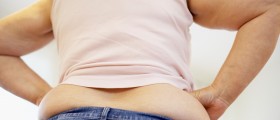
Menopause is the permanent discontinuation of the function of the ovaries among females. It usually happens during the middle of the lifespan of a woman and means that she is no longer able to produce offsprings. Signs and symptoms of menopause include hormonal change, excessive sweating, migraine, rapid heartbeat, itching of the vagina, frequent urination, watera dishcarge and bleeding from the vagina, vaginal and urinary tract infections, but also back pain, muscle pain, and osteoporosis. Psychological symptoms of menopause are depression, fatigue, irritability, memory loss, problems sleeping. Symptoms typical of menopause are also decreased libido, vaginal dryness and atrophy. Although women gain weight as they age, maybe the biggest weight problems occur during or right after the menopause. Sometimes, the weight was gained prior to menopause, but the process of menopause made it difficult to put it off as easy as it was before a woman entered that phase of her life.
Causes
One of the causes of weight gain might be the hormonal change associated with menopause. However, other factors play a significant role in body changing process, such as less time spent exercising, more eating and burning less calories, since the number of calories a woman needs for energy decreases with age. Muscles burn more calories than fat, and one of unfortunate facts of aging is that it enhances the replacement of muscle with fat. So, a woman with more fat than muscle, has a slower metabolism, and if she takes more calories than she needs, they are not burnt but accumulated in the form of more fat. Other factor of weight gain is genetics. A woman may be predisposed to gain more weight if her close relatives had bigger bellies too.
Weight gain can also have serious implications for your health. Excess weight increases your risk of high cholesterol, high blood pressure and insulin resistance, which can lead to type 2 diabetes. These factors also put you at increased risk of heart disease and stroke.
Menopause weight gain and how to lose it
There\'s also evidence that weight gain after menopause increases breast cancer risk. Women who gain in excess of 20 pounds after menopause increase their breast cancer risk by nearly 20 percent. On the other hand, losing weight after menopause can reduce breast cancer risk.
Prevention
Prevention of weight gain is important for the general health of a woman. Excess weight increases a woman\'s risk of high cholesterol, high blood pressure and diabetes, even of heart condition or stroke, and recent studies have shown that weight gain after menopause increases the risk of breast cancer. So, there are many reasons for a woman to put off the excess weight she accumulated during or after the menopause. There is no drug a woman can drink and which will miraculously eliminate excess weight. The most effective method of eliminating excess fat is by increasing physical activity and reducing the intake of calories. Aerobic and strength training increase muscle mass, strengthen bones and improve metabolism. With more muscles than fat, a woman can burn more calories. A woman can walk more, ride a bicycle, do gardening or simply take the stairs instead of the elevator whenever she has a chance. Before the muscle mass increases, a woman must change her diet. It must incorporate more fruits and vegetables, and less caloric foods. However, it is important not to cut back on calorie intake drastically, since it may have serious consequences on the body.

















Your thoughts on this
Loading...